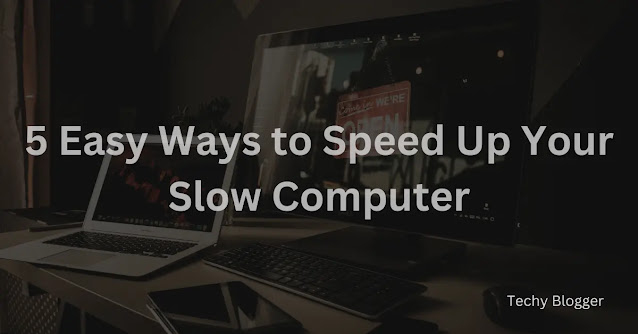5 Easy Ways to Speed Up Your Slow Computer
Is your computer slow? Are your coworkers annoyed with how long it takes to open files and documents on office computers? No matter what the case is, there are ways you can speed up that sluggish old computer. In this article, I'll talk about five easy tips to help make you faster on your desktop PC or laptop.
Delete unnecessary files
Deleting unnecessary files can help speed up your computer. This is especially true regarding large files, such as photos and videos. The more space you have available, the faster your computer can function.
However, this does not mean you should delete every unnecessary file on your computer. On the contrary, it is essential to analyze unnecessary files and delete them carefully without hesitation.
The best way to do this is using a free program such as Recuva or Scanner Pro. These programs allow you to scan your hard drive for lost files and restore them if they remain intact.
Uninstall unused programs
Sometimes, you must realize how many programs are consuming your computer resources.
You can speed up your computer's performance by uninstalling programs that are no longer used or using less-used programs.
The first step to speeding up your computer is to uninstall programs you don't use. This will help your computer run more efficiently and save memory space on the hard drive.
You can identify which programs are running by going to Start > All Programs > Accessories > System Tools > Task Manager (Windows XP) or Start > All Programs > Accessories > System Tools > Task Manager (Windows Vista).
Suppose you need to figure out why a program is running. In that case, it's probably because it was installed automatically with a new version of Windows or because you updated some software already installed on your computer. Only uninstall these programs if you know what they do and why they're needed. 5 Easy Ways to Speed Up Your Slow Computer.
Stop unnecessary startups
By preventing unnecessary programs from starting with your PC, your system will start up faster and be ready for use more quickly.
When unnecessary programs run in the background, they can consume system resources such as memory and CPU power. Stopping these programs from starting up can free up these resources for other essential tasks.
When too many programs run simultaneously, the chances of crashes or errors are increased. Stopping unnecessary startups can help reduce the risk of these issues.
By understanding which programs are starting up with your system and having the ability to stop them, you have more control over your PC. You can ensure that only the necessary programs are running at any time.
Defragment your hard drive
Defragmenting a hard drive can have several benefits, including:
Improved performance: When a hard drive becomes fragmented, it takes the computer longer to find and access the files it needs. Defragmenting reorganizes the files on the industry so they are stored in contiguous blocks, which can speed up the time it takes for the computer to access them.
Reduced wear and tear on the drive: When a computer has to access many small, scattered files, it can put more wear and tear on the industry, which can shorten its lifespan. Defragmenting reduces the amount of work the driver has to do and can help prolong its life.
Increased free space: As files are added and deleted from a hard drive, they can become fragmented and leave small free space gaps between files. Defragmenting can combine these small gaps of free space into larger, more valuable blocks of free space.
improving the speed of the overall system and boot time
It is important to note that SSDs (solid-state drives) work differently than traditional hard drives and do not require defragmentation as they don't have any mechanical moving parts. Thus, they're already faster in terms of read and write speeds.
Clean up your desktop
Cleaning up your desktop can provide a multitude of benefits to both your productivity and mental well-being.
Firstly, a cluttered desktop can cause distraction and impede your ability to focus on essential tasks. By organizing your desktop and removing unnecessary files and folders, you can create a more streamlined and visually pleasing environment that allows you to concentrate better on your work.
Additionally, having a clean desktop can also save time in the long run. Keeping your files and folders organized makes locating important documents and files easier when needed. You will only spend time searching through a cluttered desktop for the required document.
Furthermore, a clean desktop can reduce stress and improve overall mental well-being. A cluttered and disorganized desktop can cause feelings of anxiety and overwhelmed. Cleaning up and organizing your desktop can create a more peaceful and calming environment to help reduce stress levels.
Moreover, it is also a good practice regarding data security and organization. The files, images, and documents on your desktop are more prone to data breaches and viruses if not correctly managed. A cleaned-up desktop can help you identify suspicious files and take proper action to prevent possible harm. 5 Easy Ways to Speed Up Your Slow Computer.
Overall, taking the time to clean up your desktop can have numerous benefits for your productivity, mental well-being, and data security. It's worth taking a few minutes to organize your desktop and enjoy the help of a clutter-free workspace.
In conclusion, several easy ways to speed up a slow computer exist. By clearing out unwanted files and programs, running a malware scan, updating your operating system and programs, adding more memory, and removing unnecessary startup programs, you can significantly improve the performance of your computer. Remember to keep your computer updated, free up space, and regularly check the background programs to keep your computer running at its best.
